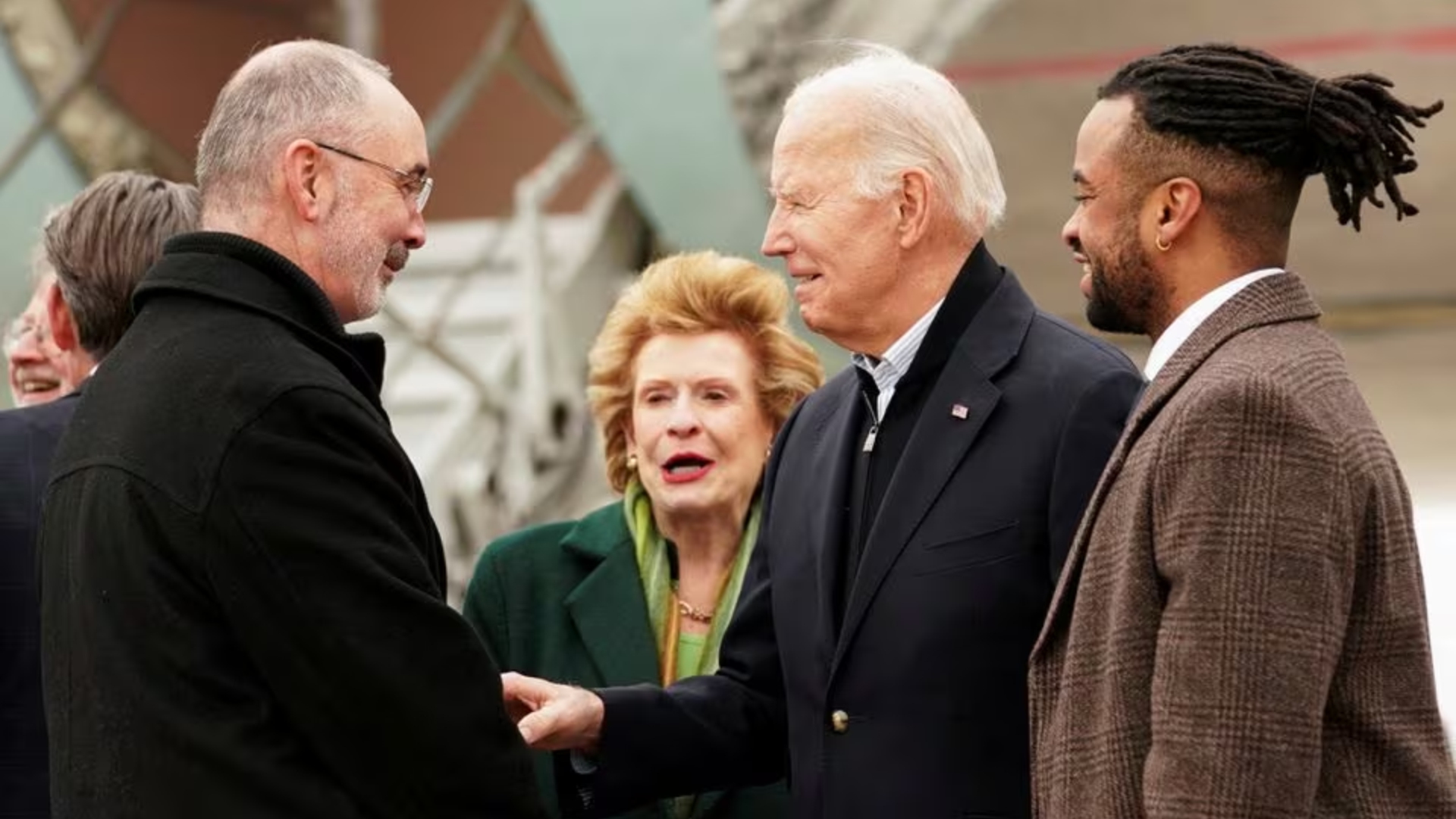WARREN, Michigan, (Reuters) – U.S. President Joe Biden won a strong pledge of support on Thursday from union autoworkers crucial to his reelection bid in Michigan, while protests over his backing of Israel’s actions in Gaza shadowed the trip.
Biden’s travel to the election battleground state was intended as a celebration after the United Auto Workers (UAW) union recently endorsed his reelection bid. But his visit was also met with protests from some of the state’s sizable Arab-American community, who demand the president seek a ceasefire in the Israel-Gaza war and have refused to meet his campaign.
Biden visited a UAW union hall in Warren, Michigan, where UAW members plan to work a phone bank on his behalf ahead of the state’s Feb. 27 nominating contest.
He was greeted by UAW President Shawn Fain, who last week gave a full-throated endorsement of the Democratic incumbent and a sharp rebuke of Republican frontrunner Donald Trump.
As the crowd chanted, “Joe, Joe,” Fain promised Biden, “We’re going to fight like hell” for him to win the November presidential election.
“Wall Street didn’t build the middle class. Labor built the middle class, and the middle class built the country,” Biden said. “When labor does well, everybody does well.”
He later joked: “Besides, you built my ’67 Corvette.”
The campaign kept specific details of the president’s visit private in the face of expected opposition until just before his arrival.
Ahead of his motorcade, about 100 protesters marched down a street toward the UAW location, chanting “Genocide Joe has got to go” and waving Palestinian flags.
Before heading to Michigan, Biden attended the National Prayer Breakfast in Washington. He said he was working to resolve the Israel-Hamas conflict, including a two-state solution for Palestinians and bringing home the hostages still held following Hamas’s Oct. 7 attack on southern Israel.
“We are actively working for peace,” he said at the breakfast.
UNION BACKING
Former President Donald Trump, Biden’s likely Republican opponent in the Nov. 5 presidential election, blasted Fain after the union leader endorsed Biden, and on Wednesday met with the Teamsters, one of America’s biggest unions representing truck drivers, airline pilots and others, as he competes for their backing.
The auto industry and its labor movement are deeply intertwined with politics and elections in Michigan.
In 2016, Trump earned a level of support from union members that no Republican had reached since Ronald Reagan in 1980, helping him narrowly capture the critical states of Pennsylvania, Michigan and Wisconsin.
Biden rebounded with unions in 2020, with a roughly 16-percentage point advantage as he reclaimed those so-called Rust Belt states, which have been scarred by decades of job losses as companies embraced lower-cost, often non-union locations. He won Michigan in 2020 by some 154,000 votes.
Across the Detroit area, protesters had amassed in cars and vans with blue and white “Abandon Biden” signs and Palestinian flags ahead of Biden’s Thursday visit, planning to rush to wherever he appeared.
“We’re ready to go. I have my megaphone in the car,” said Farah Khan, a Pakistani-American who voted for Biden in 2020 but now supports the Abandon Biden campaign in Michigan, told Reuters. “We have 92 Abandon Biden chapters across the country. This is bigger than just Michigan.”
Arab Americans account for 5% of the vote in Michigan and Biden’s margin of victory over Trump was less than 3 percentage points in 2020. An October poll showed Biden’s support among Arab Americans had plunged to 17% from 59% in 2020.
However, Biden’s campaign believes that his support from union workers could overcome any drop in support from the Arab-American community. A Biden campaign official said the UAW’s endorsement will mean more in November in Michigan than the anger among Muslim voters in the state.
Reporting by Nandita Bose and Andrea Shalal in Michigan and Steve Holland in Washington; Editing by Heather Timmons, Paul Thomasch, Susan Heavey, Jonathan Oatis and Sonali Paul











